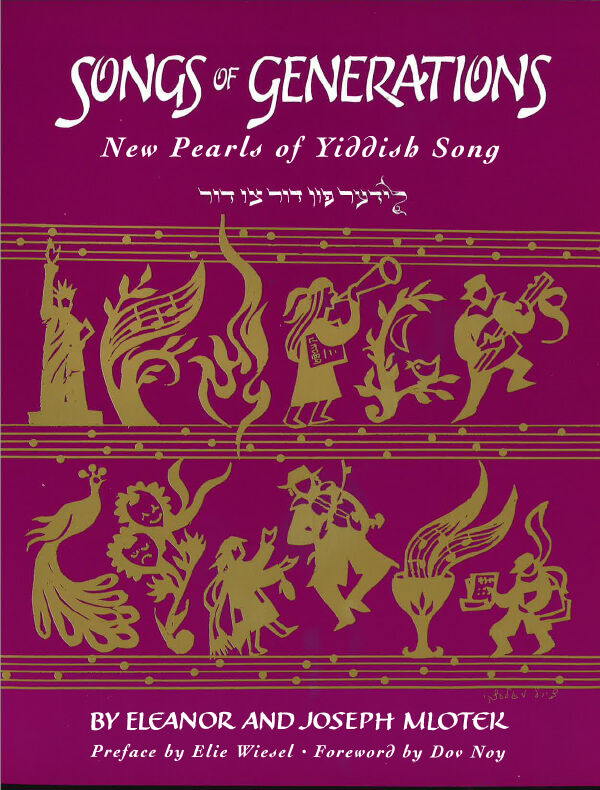The words appear in the 1897 compilation Di Yidishe Bine with Jacob Gordin credited as author, from his play Der Shvartser Yid or Meyer Yosefovitch. It was later published by J. and J. Kammen with other words by Mordkhele Chemerinsky. The version presented here is based on the song published in Sarah Schack-Ethel Cohen’s songbook (1924) and reprinted in the Soviet compilation of M. Beregovski-ltsik Fefer (1938). In the latter, the word “peyelekh” (little earlocks) was changed to “bekelekh” (cheeks) to conform to the Soviet policy of eliminating religious allusions.
The song was also printed in Lodz, entitled Yankev Kalich’s Yankele, as a folksong adapted by Kalich and sung by Molly Picon. There the song includes six days, from Sunday to Friday. It was published in Hebrew as “Yom alef lo halahti el haheder” in Songs of Israel edited by Seymour Silbermintz (1949).

On Sunday, I was not in kheyder,
because on Sunday I hate
(when the sun is shining)
to go into that dark room
and sit on the bench the whole time.
I ran until I got tired
and I sang Yankele’s Song:
Oy, is the teacher going to whip me,
he will flay my skin to pieces!
And it was evening and it was morning,
Day One.
On Monday, I was not in kheyder,
Because on Monday the goat
had a bright idea,
she tore through her tether
and was off to the other side of the bridge.
Everyone ran to catch the goat
and I sang Yankele’s Song:
Oy, is the teacher going to whip me,
he will tear out my peyes!
And it was evening, and it was morning,
A Second Day.
On Tuesday, I was not in kheyder,
because on Tuesday I remembered
that I had not eaten anything.
My father ran around like a wild man,
My mother went to borrow bread,
and I ran until I got tired,
and I sang Yankele’s Song:
Oy, is the teacher going to whip me,
he will flay my skin to pieces!
And it was evening, and it was morning
A Third Day.
Note: peyes (or, sometimes, peyot) = sidelocks.
Zuntik bin ikh nit geven in kheyder,
Vayl zuntik hob ikh faynt,
Ven di zun shaynt,
Tsu geyn in fintstern kheyder
Un kvetshn di bank keseyder.
lkh bin gelofn biz ikh bin gevorn mid
Un ikh hob gezungen Yankeles lid:
Oy, vet mikh der rebe shmaysn
Mayn hoyt vet er mir oyf shtiker tseraysn!
Vayhi erev vayhi voyker
Yoym ekhod.
Montik bin ikh nit geven in kheyder,
Vayl montik iz di tsig
Poshet gevorn klig,*
Zi hot ibergerisn di shtrik
Un iz ariber oyf yener zayt brik.
Ale zaynen gelofn khapn di tsig,
Un ikh hob gezungen Yankeles lid:
Oy, vet mikh der rebe shmaysn,
Mayne peyelekh vet er mir oysraysn!
Vayhi erev vayhi voyker
Yoym sheni.
Dinstik bin ikh nit geven in kheyder,
Vayl dinstik hob ikh nit fargesn
Az ikh hob gehat nit gegesn.
Der tate iz arumgelofn, vi a vilder yid,
Di mame iz gegangen layen broyt,
Un ikh bin gelofn biz ikh bin gevorn mid,
Un ikh hob gezungen Yankeles lid:
Oy, vet mikh der rebe shmaysn,
Mayn hoyt vet er mir oyf shtiker tseraysn!
Vayhi erev vayhi voyager
Yoym Shlishi.
זונטיק בין איך ניט געװען אין חדר,
װײַל זונטיק האָב איך פֿײַנט
װען די זון שײַנט
צו גײן אין פֿינצטערן חדר
און קװעטשן די באַנק כּסדר,
איך בין געלאָפֿן ביז איך בין געװאָרן מיד
און איך האָב געזונגען יאַנקעלעס ליד:
אױ, װעט מיך דער רבי שמײַסן,
מײַן הױט װעט ער מיר אױף שטיקער צערײַסן!
ױהי ערבֿ ױהי בֿוקר
יום אחד.
מאָנטיק בין איך ניט געװען אין חדר,
װײַל מאַנטיק איז די ציג
פּשוט געװאָרן קליג, (קלוג)
זי האָט איבערגעריסן די שטריק
און איז אַריבער אױף יענער זײַט בריק.
אַלע זײַנען געלאָפֿן כאַפֿן די ציג,
און איך האָב געזונגען יאַנקעלעס ליד:
אױ, װעט מיך דער רבי שמײַסן,
מעַנע פֿאהלעך װעט ער מיר אױסרײַסן!
ױהי ערבֿ ױהי בֿוקר
יום שני.
דינסטיק בין איך ניט געװען אין חדר,
װײַל דינסטיק האָב איך ניט פֿאַרגעסן,
אַז איך האָב געהאַט ניט געגעסן.
דער טאַטע איז אַרומגעלאָפֿן װי אַ װילדער ייִד,
די מאַמע איז געגאַנגען לײַען ברױט,
און איך בין געלאָפֿן ביז איך בין געװואָרן מיד,
און איך האָב געזונגען יאַנקעלעס ליד:
אױ, װעט מיך דער רבי שמײַסן,
מײַן הױט װעט ער מיר אױף שטיקער צערײַסן!
ױהי ערבֿ ױהי בֿוקר
יום שלישי.
Song Title: Oy, Vet Mikh Der Rebe Shmaysn

The Songs of Generations: New Pearls of Yiddish Song anthology comprises songs that were either never printed before or appeared in rare and inaccessible publications — sometimes in different versions and without proper sources. Most of the songs in this book were submitted by readers of Chana and Yosl’s column “Perl fun der yidisher poezye” (Pearls of Yiddish Poetry) in the Yiddish newspaper Der Forverts (The Forward), initiated in October, 1970. Over 25 years, thousands of songs were collected in correspondence and on cassettes from readers throughout the world, and they represent a veritable national Yiddish song archive. Chana Mlotek, in her introduction, writes, “In the course of years the inquiries, contributions and enthusiasm of these readers have kept our own interest unflagging and have reinforced our dedication to this effort. And in recent years our participants have also been augmented by new readers from the former Soviet Russia, who receive our newspaper there or from newly-arrived immigrants in this country and Israel.”